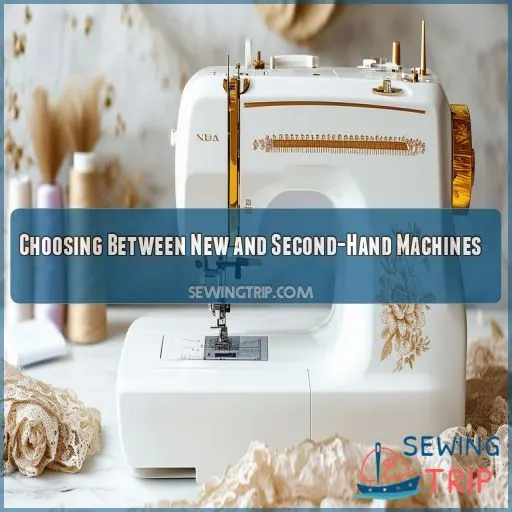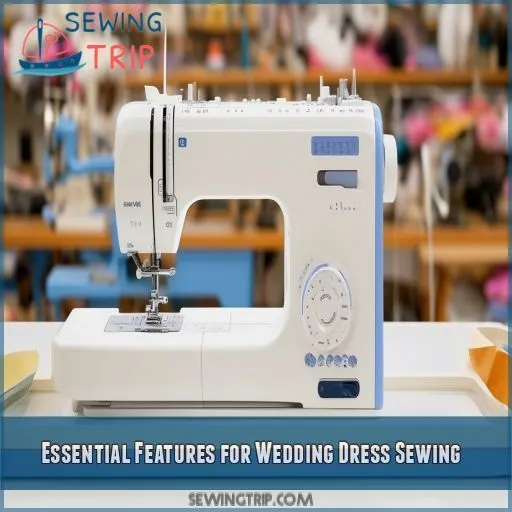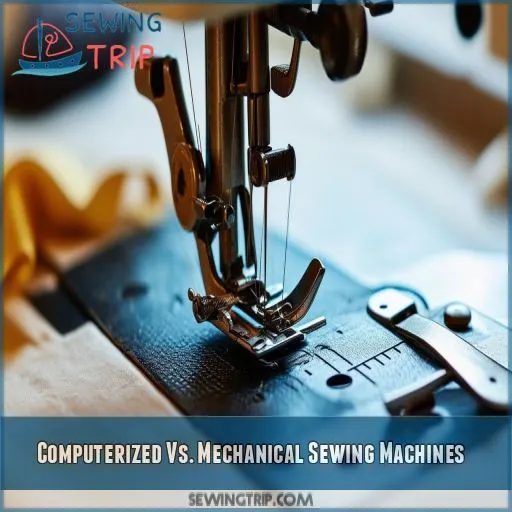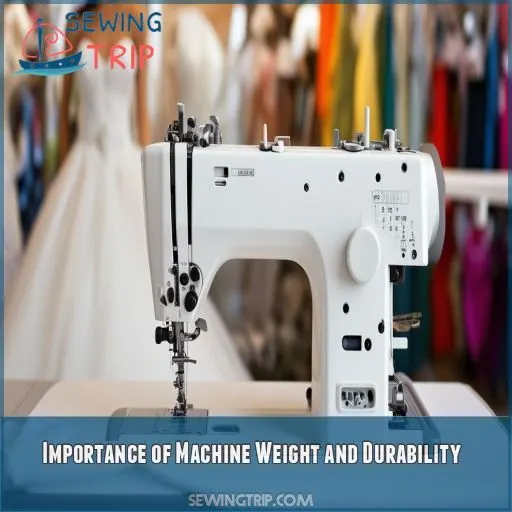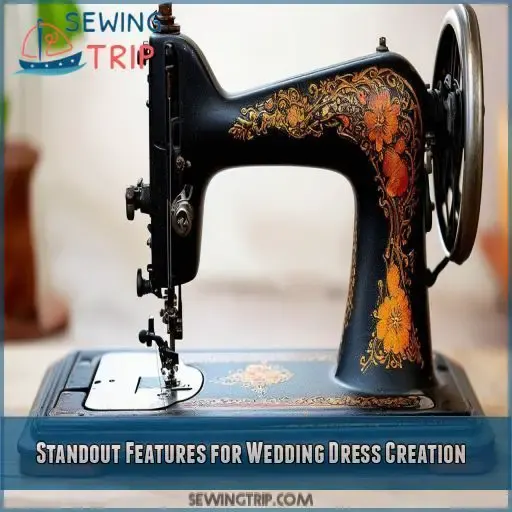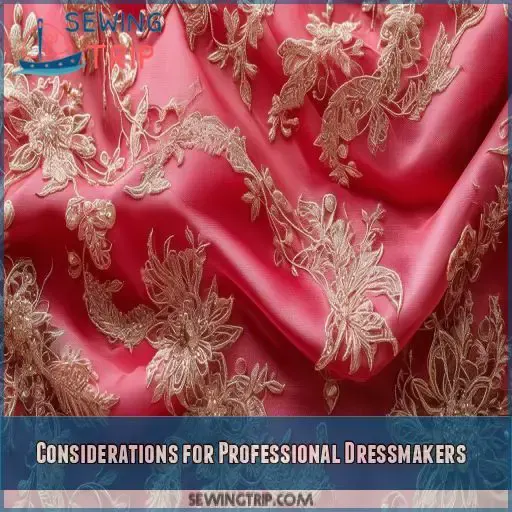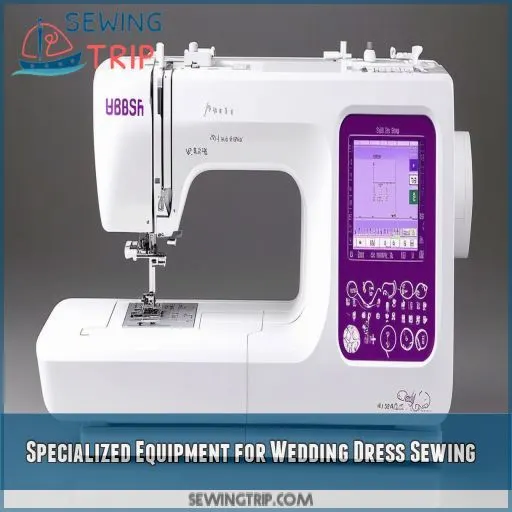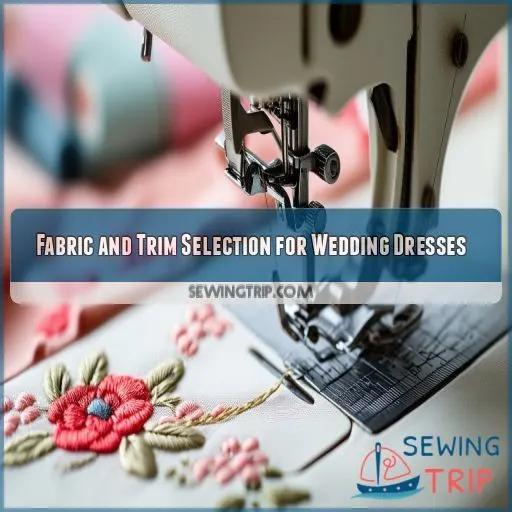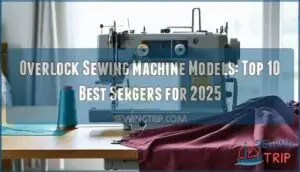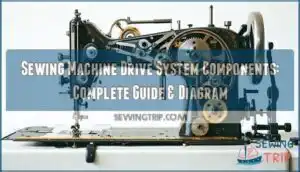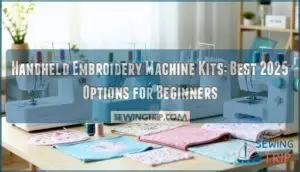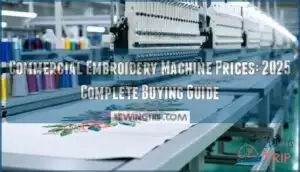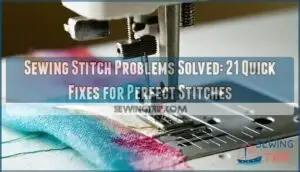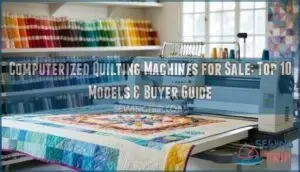This site is supported by our readers. We may earn a commission, at no cost to you, if you purchase through links.
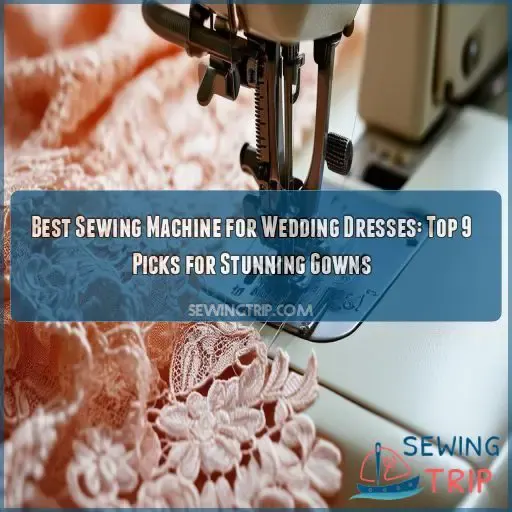 When choosing the best sewing machine for wedding dresses, you’ll want to focus on features that cater to delicate fabrics and intricate details.
When choosing the best sewing machine for wedding dresses, you’ll want to focus on features that cater to delicate fabrics and intricate details.
Look for machines with a variety of stitch options, including straight, zigzag, and blind stitches. Automatic needle threaders and built-in thread cutters can save you time and frustration.
Consider models like the JUKI TL2000Qi for durability or the Singer 9960 for extensive stitch selection.
Don’t forget about presser feet varieties – a walking foot is essential for even fabric feeding.
Whether you opt for a computerized or mechanical machine, make certain it has the power and precision to handle the demands of wedding dress creation.
Let’s explore your options further.
Table Of Contents
- Key Takeaways
- 9 Best Sewing Machines for Wedding Dresses
- 1. JUKI TL2000Qi Sewing Quilting Machine
- 2. Singer 9960 Sewing Quilting Machine
- 3. Brother CS7000X Computerized Sewing Quilting Machine
- 4. Janome Computerized Quilting Sewing Machine
- 5. Bernette B79 Computerized Sewing Embroidery Machine
- 6. Magicfly Mini Sewing Machine
- 7. Singer Studio S16 Industrial Portable Machine
- 8. Janome Blue Couture Sewing Machine for Beginners
- 9. Janome HD3000 Heavy Duty Sewing Machine
- Choosing Between New and Second-Hand Machines
- Essential Features for Wedding Dress Sewing
- Computerized Vs. Mechanical Sewing Machines
- Importance of Machine Weight and Durability
- Standout Features for Wedding Dress Creation
- Considerations for Professional Dressmakers
- Specialized Equipment for Wedding Dress Sewing
- Fabric and Trim Selection for Wedding Dresses
- Frequently Asked Questions (FAQs)
- Conclusion
Key Takeaways
- Find a sewing machine that can handle delicate fabrics and intricate details. Look for features like a variety of stitch options, automatic needle threaders, and built-in thread cutters.
- Consider your budget and needs when choosing a sewing machine. There are a variety of machines available, from basic models to high-end models with all the bells and whistles.
- Read reviews and compare different models before making a decision. This will help you find the best machine for your needs and budget.
- Practice makes perfect! The more you sew, the better you will become. Don’t be afraid to make mistakes, and don’t give up if you don’t get it right the first time.
9 Best Sewing Machines for Wedding Dresses
You’ll find a range of excellent sewing machines for crafting wedding dresses, from the industrial-strength JUKI TL2000Qi to the beginner-friendly Janome Blue Couture. Whether you’re a professional dressmaker or an ambitious hobbyist, these nine machines offer features like automatic needle threading, built-in stitches, and heavy-duty construction to help you create stunning bridal gowns.
1. JUKI TL2000Qi Sewing Quilting Machine
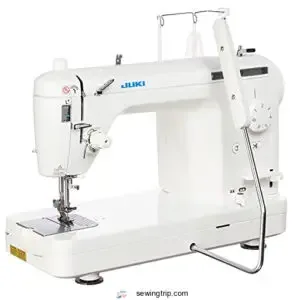
You’ll adore the JUKI TL2000Qi for crafting exquisite wedding gowns. This steadfast machine boasts 1500 stitches per minute, ideal for rapid seam-making. Its all-metal body guarantees stability, while the tapered head enhances visibility – vital for intricate lacework.
The automatic thread cutter and adjustable presser foot pressure streamline your workflow. It’s a delight to sew on, producing immaculate straight stitches.
While it’s a one-trick pony with only straight stitches, that’s all you require for most wedding dress construction.
Best For: Quilters seeking a dependable, high-quality machine for simple, precise straight stitching.
- Durable all-metal construction for stability
- Speedy 1500 stitches per minute for efficient sewing
- Automatic thread cutter for effortless finishing
- Limited to straight stitches only
- May require a voltage converter for use outside the US
- Requires regular oiling for optimal performance
2. Singer 9960 Sewing Quilting Machine
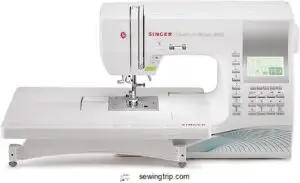
You’ll love the Singer 9960 for crafting wedding dresses. With 600 built-in stitches and 5 alphanumeric fonts, you’ve got endless creative possibilities.
Its 850 stitches-per-minute speed lets you breeze through projects, while the automatic needle threader saves time and frustration.
The machine’s mirror imaging and stitch elongation features are perfect for intricate bridal details.
At 20 pounds, it’s sturdy enough for heavy fabrics yet portable for on-the-go seamstresses.
Plus, with a 25-year warranty, you can confidently create beautiful gowns for years to come.
Best For: Seamstresses and crafters seeking a versatile and high-quality machine for fashion sewing, quilting, home decor, and crafting.
- Extensive stitch selection with 5 alphanumeric fonts
- Automatic needle threader for convenience
- High sewing speed of 850 stitches-per-minute
- Relatively heavy at 20 pounds
- Only compatible with 110 voltage
- Limited warranty compared to some other models
3. Brother CS7000X Computerized Sewing Quilting Machine
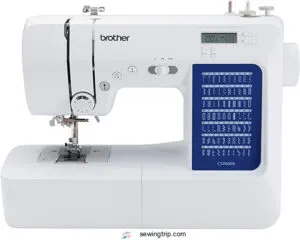
You’ll find the Brother CS7000X a reliable companion for crafting wedding dresses. With 70 unique built-in stitches and 7 one-step buttonholes, it’s versatile enough for various design elements.
The improved needle threader and large workspace make handling delicate fabrics a breeze. While it’s not ideal for heavy materials, its 750 stitches per minute speed ensures efficient work on lighter wedding dress fabrics.
Keep in mind it’s designed for US voltage, so international users should look elsewhere.
With a 25-year warranty, you’re investing in a long-term partner for your bridal creations.
Best For: Brides and seamstresses looking for a versatile and efficient sewing machine for crafting wedding dresses.
- 70 unique built-in stitches and 7 one-step buttonholes for versatility
- Improved needle threader and large workspace for ease of use on delicate fabrics
- 750 stitches per minute speed for efficient sewing
- Not recommended for heavy fabrics
- Does not come with a 1/4" foot or a right needle position
- Occasional tension issues
4. Janome Computerized Quilting Sewing Machine
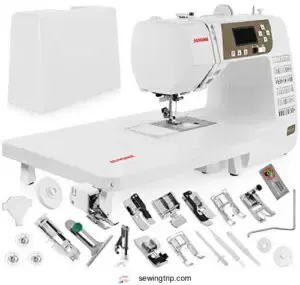
The Janome Computerized Quilting Sewing Machine is a gem for wedding dress creation.
You’ll love its 60 built-in stitches and 6 buttonhole options, giving you plenty of creative freedom. The automatic needle threader is a lifesaver when you’re working with delicate fabrics.
Its easy-to-use control panel and LCD display make selecting stitches a breeze. With a jam-proof bobbin system, you’ll spend less time troubleshooting and more time creating.
The handy function buttons, including a thread cutter and lock stitch, streamline your sewing process. It’s like having a reliable partner in your dress-making journey.
Best For: Wedding dressmakers seeking a versatile and user-friendly sewing companion.
- 60 built-in stitches and 6 buttonhole options for creative freedom
- Automatic needle threader for effortless threading
- Easy-to-use control panel and LCD display for seamless stitch selection
- May not be ideal for heavy-duty sewing
- Some users have experienced thread jamming issues
- Not mentioned if it has a cover
5. Bernette B79 Computerized Sewing Embroidery Machine
You’ll adore the Bernette B79 for crafting breathtaking wedding gowns. This formidable machine boasts 500 stitches and a convenient Stitch Designer, empowering you to tailor to your whims.
With dual feed and an adjustable foot control, you’ll glide through delicate fabrics. The 5-inch color touchscreen makes navigation effortless, while the robust aluminum frame guarantees longevity.
You’ll treasure the hover feature and vibrant LED lighting for precise work.
Additionally, with embroidery capabilities and multiple file compatibility, you can add those exceptional touches that’ll render your dresses truly unique.
Best For: Beginners, experienced users, and those seeking a versatile machine for detailed embroidery and sewing projects.
- Extensive stitch selection, color touchscreen navigation, and embroidery capabilities.
- Dual feed, programmable foot control, and large aluminum frame for precision and durability.
- Hover feature, vibrant LED lighting, and embroidery hoop detection for enhanced user experience.
- Slow startup time, limited accessories availability, and tricky lower bobbin threading.
- Function menus can be unintuitive and require memorization.
- User manual lacks clarity, and the contents of the box may differ from the listed items.
6. Magicfly Mini Sewing Machine
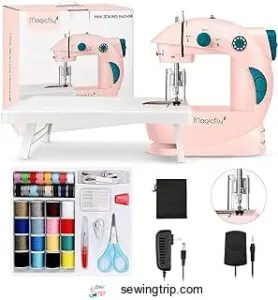
You’ll find the Magicfly Mini Sewing Machine a compact marvel for beginners. With dual power options and two-speed functionality, it’s versatile for various projects.
The double thread design guarantees stronger stitches, perfect for wedding dress details. While it’s not ideal for pros, it’s a great starting point for aspiring dressmakers.
The included sewing kit and pre-threaded setup make it user-friendly. Keep in mind, though, that some users report inconsistent performance.
If you’re just dipping your toes into wedding dress creation, this little machine might be your ticket to sewing success.
Best For: Beginners seeking a user-friendly sewing machine for wedding dress details and other projects.
- Dual power options and two-speed functionality for versatility
- Double thread design for stronger stitching
- Practical sewing kit and pre-threaded setup for ease of use
- Not recommended for professional or veteran sewers
- Some users report temperamental performance and inconsistent stitching
- Fixed stitch width/length and no backstitch function
7. Singer Studio S16 Industrial Portable Machine
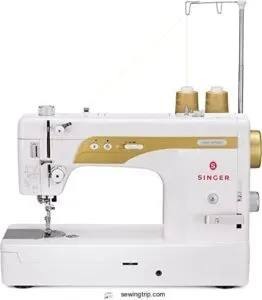
You’ll find the Singer Studio S16 a powerhouse for wedding dress creation. This industrial portable machine boasts a straight stitch only, but don’t let that fool you.
With programmable needle up/down and adjustable presser foot pressure up to 11 pounds, you’re in control. It’s a workhorse, stitching at 1600 speed, perfect for those long seams.
At 32 lbs, it’s not the lightest, but it’s built to last with a 25-year warranty.
Just remember, you’ll need HLx5 needles and there’s no automatic threader. It’s a pro’s dream for precision work.
Best For: Experienced sewers seeking a reliable, industrial-grade straight stitch machine for heavy-duty projects.
- Programmable needle up/down for convenience
- Adjustable presser foot pressure for handling various fabrics
- Durable construction with a 25-year warranty
- Requires manual needle threading
- Awkward bobbin access
- No hard cover or storage compartment
8. Janome Blue Couture Sewing Machine for Beginners
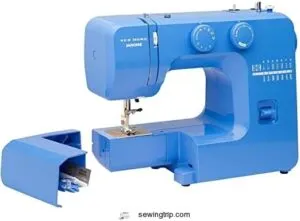
Looking for a beginner-friendly machine that won’t break the bank? The Janome Blue Couture might be your perfect match.
With 15 built-in stitches and a 4-step buttonhole, you’ll have the basics covered for crafting wedding gowns. Its heavy-duty metal frame provides stability, while the adjustable stitch length and zigzag width offer flexibility.
You’ll appreciate the removable free arm for handling sleeves and hems. Plus, with included specialty feet and a quick start guide, you’ll be sewing like a pro in no time.
It’s a solid choice for newbies diving into wedding dress creation.
Best For: Beginners looking for a budget-friendly sewing machine for wedding dress creation.
- 15 built-in stitches and 4-step buttonhole cover basic dressmaking needs
- Heavy-duty metal frame ensures stability and durability
- Included quick start guide and specialty feet for easy operation
- Limited stitch selection compared to more advanced machines
- Plastic exterior may be less durable than metal
- Some users report issues with tension and bobbin winding
9. Janome HD3000 Heavy Duty Sewing Machine
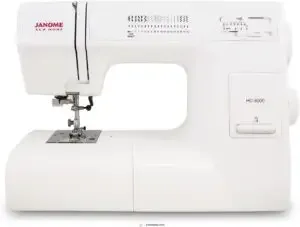
The Janome HD3000 is a workhorse that’ll stand up to the demands of wedding dress creation. With its metal construction and 8 built-in stitches, you’ll have the durability and versatility needed for basic bridal sewing.
The one-step buttonhole feature simplifies those intricate closures, while the snap-on presser feet allow quick changes for different fabric types. You’ll appreciate the built-in needle threader when working with delicate fabrics, and the reverse stitch lever guarantees secure seams.
While it’s not packed with fancy features, this machine’s simplicity and reliability make it a solid choice for crafting beautiful gowns.
Best For: Occasional or backup use, basic general sewing, sewing through thick fabrics.
- Durable metal construction
- Simple and easy to use
- Capable of sewing through thick fabrics
- Not suitable for quilting or specialized techniques
- Not as feature-rich as more expensive machines
- May be difficult to see stitch pattern selector display without additional lighting
Choosing Between New and Second-Hand Machines
When considering a sewing machine for wedding dresses, you’ll need to weigh the pros and cons of older machines against newer models. Older machines often offer better quality for the price and are easier to repair, but they may require servicing, which can cost around £90, while new machines typically come with service warranties.
Pros and Cons of Older Machines
When choosing between new and older machines for wedding dress creation, you’ll find some compelling advantages in vintage options.
Older models often come at a cheaper price point while offering easier repair options. Many seamstresses swear by the manufacturer expertise found in classic brands like Singer.
However, consider servicing availability in your area before investing in a vintage industrial lockstitch machine for your bridal gown projects.
Servicing and Repair Considerations
While older machines offer quality, they may need servicing. Consider these factors:
- Availability of local repair shops for your sewing machine
- Potential costs of regular maintenance and unexpected repairs
- Warranty coverage for new machines vs. out-of-pocket expenses
You’ll need to balance the charm of vintage with practicality. Remember, proper care extends your machine’s life. Regular cleaning, oiling, and tension adjustments can prevent major issues. Don’t shy away from simple DIY repairs – they’ll save you time and money.
Essential Features for Wedding Dress Sewing
When choosing a sewing machine for wedding dresses, you’ll need to examine the range of stitch options and presser feet varieties available. Look for machines that offer a wide array of decorative stitches and specialty presser feet, as these will be essential for creating intricate details and working with delicate fabrics commonly used in bridal gowns.
Stitch Options
When selecting a sewing machine for wedding dresses, stitch options are paramount. You’ll require a range of stitches to address various aspects of gown creation. Here’s a breakdown of indispensable stitch types:
| Stitch Type | Function | Importance |
|---|---|---|
| Straight | Basic seams | High |
| Zigzag | Finishing edges | High |
| Blind | Invisible hems | Medium |
| Stretch | Elastic fabrics | Low |
Presser Feet Varieties
When sewing wedding dresses, you’ll need more than just basic stitches. Presser feet varieties are essential for creating stunning gowns. They help you work with delicate fabrics and intricate details. Here are some essential presser feet for wedding dress creation:
- Zip foot for seamless zipper installation
- Buttonhole foot for precise button closures
- Rolled hem foot for delicate edge finishes
- Walking foot for handling slippery fabrics
- Invisible zipper foot for hidden closures
These accessories, combined with proper presser foot pressure, will enhance your wedding dress designs.
Computerized Vs. Mechanical Sewing Machines
When choosing a sewing machine for wedding dresses, you’ll need to decide between computerized and mechanical models. Computerized machines offer automated stitch settings for precision and ease of use, while mechanical machines provide manual control that some sewers prefer for intricate wedding dress details.
Advantages of Automated Stitch Settings
When crafting wedding dresses, automated stitch settings on computerized machines can be game-changers. You’ll find they simplify complex tasks and offer professional finishing touches with ease. Let’s compare some key features:
| Feature | Computerized | Mechanical |
|---|---|---|
| Stitch Tension | Automated | Manual |
| Customization | High | Limited |
| Speed Control | Adjustable | Fixed |
| Threading | Automatic | Manual |
These features enhance convenience and accuracy, allowing you to focus on your design rather than machine adjustments.
Benefits of Manual Control
While automated settings offer convenience, manual control gives you the power to create truly unique wedding dresses. You’ll have full command over stitch tension, presser foot pressure, and fabric feeding. This level of control is essential for:
- Preventing seam puckering on delicate fabrics
- Achieving perfect embroidery on intricate designs
- Mastering the art of dressmaking with precision
- Adapting to various fabric types effortlessly
With manual controls, you’ll develop a deeper understanding of your machine and become a true wedding dress artisan.
Importance of Machine Weight and Durability
When choosing a sewing machine for wedding dresses, consider the weight and durability of the machine. Compact machines weighing around 10 pounds offer portability, while heavy-duty models up to 25 pounds or more can handle thicker fabrics, and machines with metal interiors guarantee longevity for your bridal creations.
Compact Vs. Heavy-Duty Machines
When choosing between compact and heavy-duty machines, consider your needs.
Compact models offer portability, weighing around 10 pounds, perfect for on-the-go seamstresses.
Heavy-duty machines, weighing up to 25 pounds, provide stability and power for thick wedding fabrics.
Industrial machines with differential fabric feed excel at handling delicate materials.
Metal Interior Components
While compact machines are portable, heavy-duty ones with metal interiors are your best choice for wedding dresses. They’re built to last, handling delicate fabrics and multiple layers with ease. You’ll appreciate the durability and precision they offer. Here are three key benefits of metal interior components:
- Extended lifespan
- Improved stitch quality
- Better handling of heavy fabrics
Look for features like steel plates, needle feed systems, and differential feed for excellent performance in creating stunning gowns.
Standout Features for Wedding Dress Creation
When creating wedding dresses, you’ll find certain features particularly useful. An automatic needle threader saves time and frustration, a built-in thread cutter enhances efficiency, and a walking foot guarantees even fabric feeding for delicate materials.
Automatic Needle Threader
You’ll love the automatic needle threader on your wedding dress sewing machine. It’s a game-changer for fashion students and pros alike. No more squinting or struggling with thread guides! This feature smoothly guides the thread through the needle’s eye, saving time and reducing eye strain.
With metal interiors and compact sizes, these machines offer precision and portability.
You’ll breeze through ready-to-wear garments, mastering thread tension effortlessly.
Built-in Thread Cutter
After threading your needle with ease, you’ll love the built-in thread cutter feature. This time-saving marvel eliminates the need for scissors, allowing you to snip threads with precision at the touch of a button.
It’s a game-changer for fabric handling, especially when working on delicate wedding gowns.
Whether you’re quilting, serging, or creating professional-quality stitches, this feature streamlines your workflow and keeps your workspace tidy.
Walking Foot
While a built-in thread cutter saves time, a walking foot is your secret weapon for flawless fabric handling. This specialty foot feeds both layers of fabric evenly, maintaining perfect alignment.
It’s a game-changer for wedding dresses, especially when working with slippery silks or delicate laces.
You’ll find it indispensable for keeping seams smooth and preventing puckering, even on tricky fabrics that challenge beginners.
Considerations for Professional Dressmakers
When selecting a sewing machine for wedding dresses, you’ll need to take into account the power and durability requirements for handling delicate fabrics and intricate designs. It’s also essential to check the availability of local servicing options to guarantee your machine remains in optimal condition for creating stunning gowns.
Power and Durability Requirements
When creating wedding dresses, you’ll need a machine that can handle the job. Here are three key power and durability requirements:
- Robust motor for consistent stitch quality
- Sturdy construction to manage heavy fabrics
- Adjustable presser foot pressure for delicate materials
The Singer Quantum Stylist 9960 and Juki TL-2000Qi excel in these areas. They’re not quite industrial machines, but they offer the power and durability you need for crafting stunning gowns without breaking the bank.
Local Servicing Options
When choosing a sewing machine for wedding dresses, don’t overlook local servicing options. You’ll want a reliable technician nearby who can handle both your sewing machine and overlocker.
Consider the availability of parts, costs, and timing for repairs. Look for authorized dealers with skilled technicians who understand the intricacies of feed dogs, free arms, and extension tables.
This foresight will keep your bridal business running smoothly, even when hiccups occur.
Specialized Equipment for Wedding Dress Sewing
To create stunning wedding dresses, you’ll need specialized equipment beyond your sewing machine. A hi-steam press-iron with a Teflon plate guarantees flawless fabric pressing, while a dress form allows you to fit and drape gowns with precision, guaranteeing a perfect silhouette for every bride.
Hi-Steam Press-Iron With Teflon Plate
You’ll need a hi-steam press-iron with a Teflon plate for wedding dress creation. It’s essential for applying fusible materials and achieving crisp, professional finishes.
Adjust heat settings for different fabrics, and master press-iron techniques to avoid damaging delicate materials.
Maintain your Teflon plate regularly for excellent performance.
While alternative surfaces exist, nothing beats a quality hi-steam press-iron for wedding gown perfection.
Dress Form
When creating stunning wedding gowns, a dress form is your essential companion. It’s indispensable for achieving the perfect fit and drape. You’ll find various types to suit your needs:
- Adjustable forms for customizable sizing
- Padded forms for realistic body shapes
- Professional-grade forms for high-end designs
Invest in a quality dress form that matches your clients’ measurements. It’ll make fitting, marking, and adjusting your creations a breeze, especially when working with delicate fabrics and intricate details like rigilene boning.
Fabric and Trim Selection for Wedding Dresses
When selecting fabrics for wedding dresses, consider white voile for skirts as it offers a light, airy quality that’s perfect for flowing designs. For a polished finish, incorporate lace-covered hook and eye tape, which provides both functionality and elegance to your gown closures.
White Voile for Skirts
When crafting wedding dresses, white voile is your go-to fabric for ethereal skirts. This lightweight, semi-sheer material drapes beautifully and creates a dreamy effect.
You’ll find sewing voile a breeze with the right machine and techniques. Pair it with illusion mesh for added dimension.
Remember to use a self-healing rotary mat and sharp cutter for precise cuts.
1/2" wide double-fold bias tape can add structure to your voile wedding dress designs.
Lace-Covered Hook & Eye Tape
While white voile adds ethereal beauty to skirts, don’t overlook the importance of lace-covered hook & eye tape for your wedding gowns.
This elegant closure solution blends seamlessly with delicate fabrics, ensuring a polished finish. When making bridal alterations, this tape’s discreet nature allows for a smooth silhouette.
Master its application, and you’ll elevate your dressmaking skills, creating stunning closures that belong in high-end boutiques.
Frequently Asked Questions (FAQs)
What kind of sewing machine do professionals use?
You’ll find pros using industrial machines like Juki, Brother, or Singer. They’re built for heavy-duty work, with high-speed stitching and durable construction. These powerhouses handle thick fabrics and long hours, ensuring exceptional results for every project.
What is the common sewing machine used by tailors and dressmakers?
You’re on the edge of your seat, keen to discover the secret weapon of tailors and dressmakers. Well, here’s the scoop: they often rely on industrial straight-stitch machines. These powerhouses can handle heavy fabrics and deliver precise stitches effortlessly.
What fabric is commonly used for sewing wedding gowns?
You’ll commonly find satin, silk, tulle, and lace in wedding gowns. These fabrics offer elegance and versatility. Chiffon’s popular for its lightweight, flowing nature. Don’t forget about organza and taffeta – they’re perfect for creating volume and structure.
What sewing machines do fashion houses use?
Fashion houses often use models like the Juki DDL- It’s reliable for precise stitching, high-speed production, and can handle various fabrics seamlessly, ideal for the intricate details needed in high-end wedding dress design.
What is the best dressmaking sewing machine?
The Juki HZL-F600 is ideal for dressmaking. Its versatility, precise fabric handling, variety of presser feet, superior buttonhole construction, and durable build make it perfect for creating intricate, high-quality wedding dresses.
What is a dressmaking sewing machine?
A dressmaking sewing machine is your trusted companion, designed to craft precise garments. It features a variety of stitches, adjustable presser foot pressure, and specialty presser feet to handle diverse fabrics and intricate details seamlessly.
How much does a sewing machine cost for dressmaking?
A dressmaking sewing machine typically costs between £250 and £ For specialized work like wedding dresses, prioritize features such as straight and zigzag stitches, adjustable presser foot pressure, and reliable fabric handling capabilities.
Should you buy a sewing machine for dressmaking?
Absolutely, you should buy a sewing machine for dressmaking! It gives you unparalleled control, enabling detailed, precise garment construction, and allows you to express your unique style without reliance on off-the-rack options.
What is the best sewing machine to buy?
For making wedding dresses, the Juki TL-2010Q is your best bet. It’s durable, handles delicate and heavy fabrics effortlessly, has precise stitching for fine details, and offers both speed and control for intricate designs.
What are the best computerized dressmaking machines?
When choosing a computerized dressmaking machine, consider the Juki F-600 or Janome HD-3000, which offer advanced features like fabric handling, buttonhole construction, and included presser feet, perfect for creating intricate wedding dresses with precision and ease.
How long does it take to sew a wedding dress?
Sewing a wedding dress typically takes 50-60 hours, depending on complexity, details, and fabric. Precise planning, careful fabric handling, and time management are key to ensuring flawless construction and intricate detailing.
Can I alter a store-bought dress with a home machine?
Altering a store-bought dress with a home machine is achievable. Symbolizing freedom, adjustments such as hem changes, taking in seams, or adding embellishments can be done effectively. Make certain you test on scrap fabric first.
Whats the average cost of materials for a wedding dress?
The average cost of materials for a wedding dress ranges from £150 to £800, depending on the fabric, lace, and embellishments you choose, as well as additional supplies like boning, lining, and special trims.
Are certain fabrics easier to work with for beginners?
Cotton and polyester are easier for beginners because they’re less slippery and more predictable under the needle. Avoid silk and chiffon initially, as they require greater precision and can be frustrating to handle.
How do I properly clean and maintain my sewing machine?
To maintain your sewing machine, clean the bobbin area and feed dogs after each project, oil the machine where recommended, change needles regularly, and cover it when not in use to avoid dust accumulation.
Conclusion
Surprisingly, finding the best sewing machine for wedding dresses is more about understanding an ocean of features than searching for Cinderella’s slipper.
Focus on models like the JUKI TL2000Qi and Singer 9960 for their stitch versatility and durability.
Prioritize machines with automatic needle threaders, built-in thread cutters, and a walking foot to handle those delicate fabrics.
With the right equipment and attention to detail, you’ll be crafting stunning gowns with ease and efficiency.

